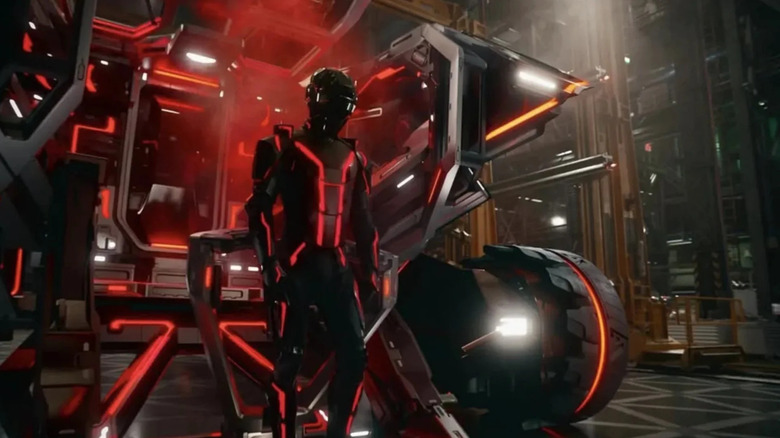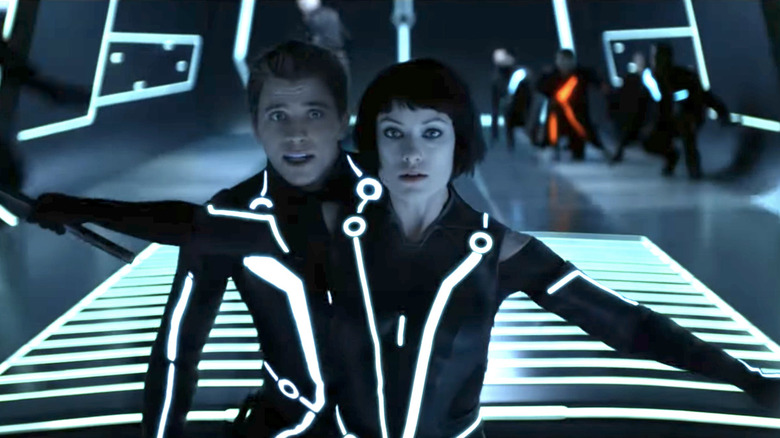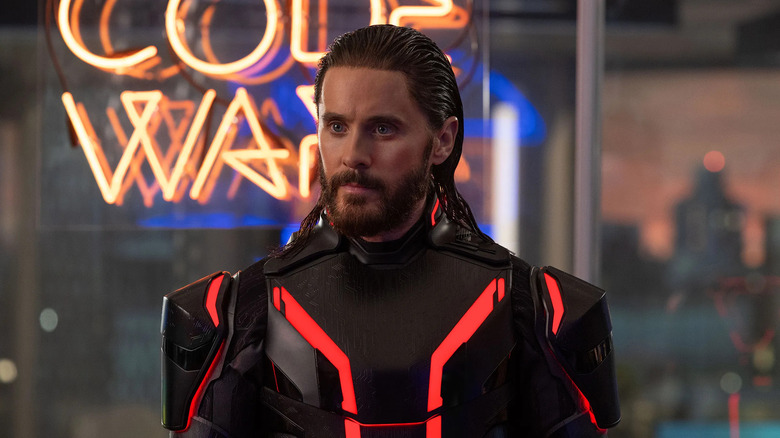NIN's Tron: Ares Soundtrack Is Very Different From Daft Punk (And That's A Good Thing)
Ever since the release of "Tron: Legacy," a prevailing take on the film has been that it's a movie whose main attraction is its score. While the film has been reappraised of late and there are those of us "Tron" fans who've always believed it to be a remarkably inventive, thoughtful, and emotional follow-up to the 1982 original, there's no denying that the score to "Legacy" is not only fantastic, but is remarkably influential. This is because the primary composers of that score are the legendary French Touch electronica duo, Daft Punk. By the time the band wrote the score to "Legacy" (which was orchestrated by composer Joseph Trapanese), they had already been climbing up the charts for the past 15 years. Although they only made five studio albums (with "Legacy" being the fourth), their influence on the house, electronic, dance, pop, and even hip-hop genres was immeasurable.
Daft Punk's score for "Tron: Legacy" became virtually synonymous with the franchise. Although a proper sequel to "Legacy" took 15 years to get made, stopgap projects within the franchise like Disneyland's "ElecTRONica" event and "Tron Lightcycle Power Run" ride either made use of the Daft Punk score or had original material that sounded like it. Although fans were understandably disappointed when it was announced that the long-awaited sequel "Tron: Ares" would not include a Daft Punk score, it was only to be expected, considering the duo broke up in 2021.
Their replacement is certainly no downgrade, however, as it was revealed to be none other than Nine Inch Nails. Now that "Ares" and its album have been released, it's apparent that NIN has elected not to use any of Daft Punk's thematic material and that their score doesn't even have the same sound. This is a good thing, as it not only gives "Ares" its own unique sonic identity but also continues the "Tron" tradition of electronic music innovation.
Daft Punk's score for 'Tron: Legacy' brings out the deeper emotions of the characters
The "Tron" films are more speculative and philosophical works of sci-fi/fantasy than emotional stories. The original 1982 film, written by director Steven Lisberger and Bonnie MacBird, sought to support Lisberger's interest in pushing the craft of animation, computer-generated imagery, and the aesthetic of video games forward. Part "Alice in Wonderland," part "The Wizard of Oz," and part "Star Wars," it tells the tale of computer programmer and video game designer, Kevin Flynn (Jeff Bridges), who is literally sucked into the world of the computer programs and helps them battle a fascist Master Control Program so they can become a free system. In conjunction with the film's groundbreaking tech and imagery was a score composed by the similarly groundbreaking electronic musician Wendy Carlos, who used a combination of analog and digital synthesizers to create the score. (Journey also wrote two original songs for the film.)
Although Carlos wrote a main theme for "Tron," Daft Punk chose not to utilize it for their score for "Legacy." (Carlos' themes do turn up in "Ares," but not within NIN's score.) Instead, the duo honed in on the emotional story of the movie, written by Edward Kitsis and Adam Horowitz, in which Flynn's estranged son Sam (Garrett Hedlund) discovers that his long-missing father didn't intentionally abandon him, and has been stuck inside The Grid for many years at the behest of a rogue program, CLU (also Bridges, in one of the first instances of de-aging technology). "Legacy" includes a few cues which harken back to Daft Punk's dance roots (namely "Derezzed" and "End of Line"), but the score is built around a soaring main theme that's bolstered by a distinct electronic synth sound. It's heavily thematic, allowing for its textures and melodies to be varied along with the film's road movie-esque structure while feeling all of a piece.
NIN's score for 'Tron: Ares' is a musical representation of an internal and external breakdown
NIN is comprised of Trent Reznor and Atticus Ross, who have become prolific composers for films in their own right, providing an all-electronic score or that of Reznor's vocals, as the duo's work on "Bones & All" and "Challengers" proves. As it turned out, the intent behind the attribution to NIN was not just a mere marketing ploy. The sound of the music is distinctly Nine Inch Nails: industrial, electronic, and goth. At times, the score features propulsive techno rhythms that are similar to the vibe Daft Punk brought to "Legacy," but that's where the overlap between the scores ends.
Joachim Rønning wanted NIN for "Ares" because the film features a reversal of the structure of the first two "Tron" movies: instead of a character going into the computer world, vehicles and programs from the computer world emerge into the real world. As Rønning told Discussing Film, NIN's sound best exemplified "the two different worlds colliding," and one can hear NIN's signature industrial carnage within the score as previously heard in their other songs like "March of the Pigs" and "The Perfect Drug." This collision occurs on a character level, too, as the Program, Ares (Jared Leto), begins to become self-aware and turn on his creator, the unscrupulous Julian Dillinger (Evan Peters). Ares is someone whom Julian has programmed to be born within the real world and die a half-hour later, and the process of de-rezzing is demonstrably unpleasant. Hence, Reznor's signature strained howl combined with Ross' crackling synths make for a perfect expression of such a tortured being.
While the merits of all three "Tron" films go beyond just their music, there's no doubt that their scores do a lot of the heavy lifting. The fact that each score is distinctive isn't a bug, but a feature. One of the themes of the "Tron" films is a celebration of evolution and diversity. These movies don't inspire because of how much they stay the same, but because of how unique they can be. Thanks to NIN, "Tron: Ares" continues this tradition.


